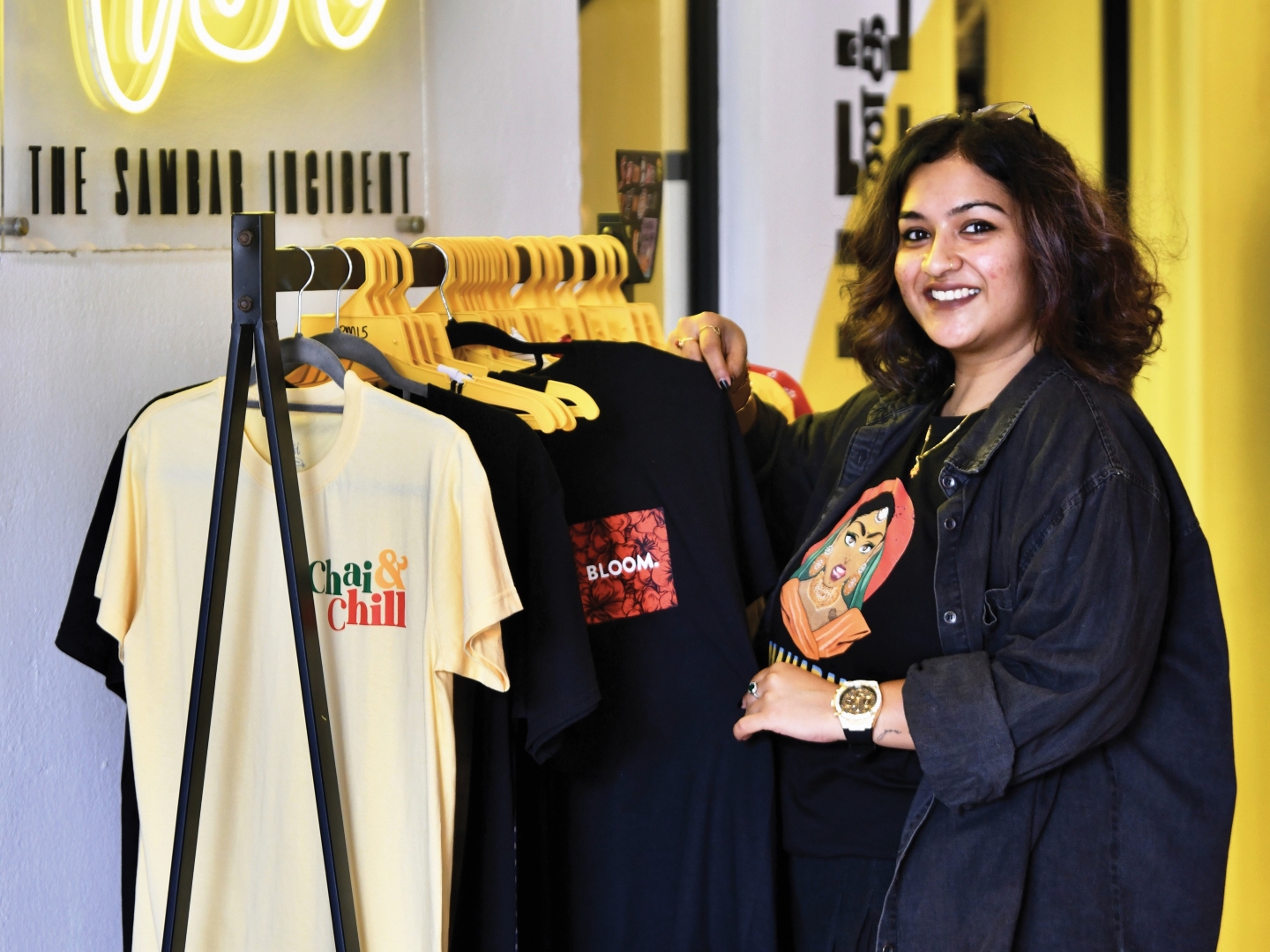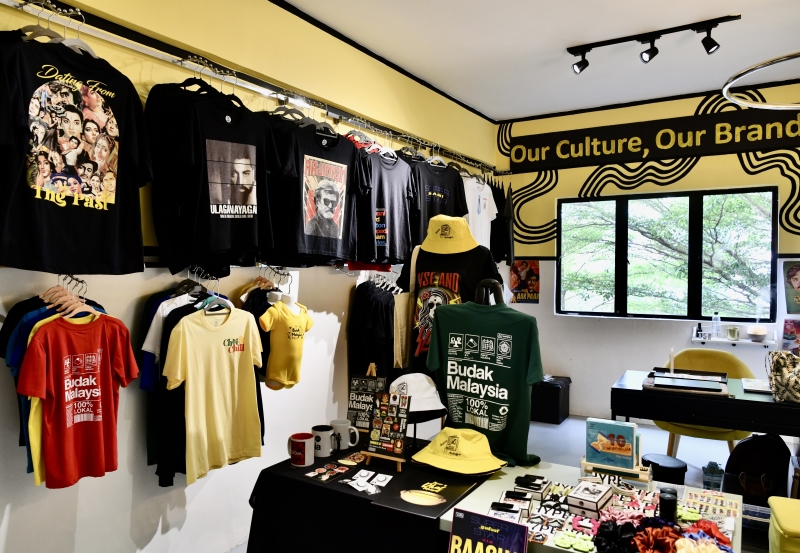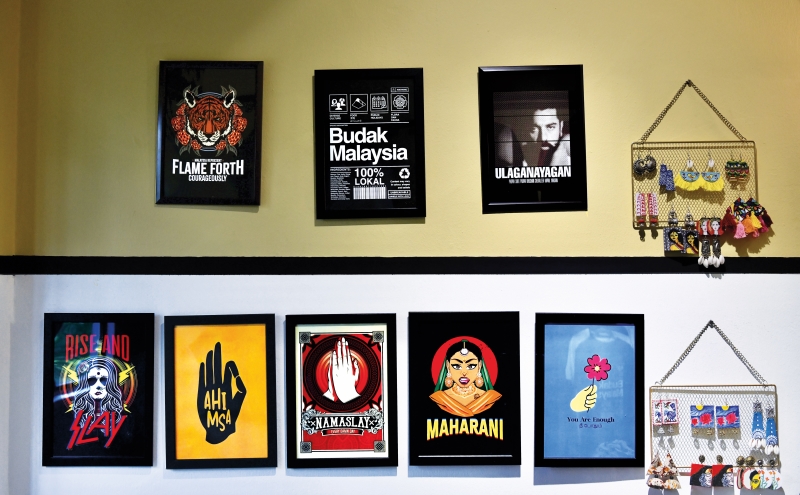
Every element in TSI’s store design was curated by Lobhini to empower and inspire customers (All photos: Sam Fonng/ The Edge Malaysia)
Over the past few years, Kedai KL at Mahsa Avenue, Petaling Jaya, has become one of several locations where homegrown craftspeople and creatives come to set up shop. Situated on the second floor of the building, by the chequered-floored main atrium, is one such establishment — a bright-yellow storefront with a neon sign by the door made up of the letters “TSI” for The Sambar Incident.
Now owning a faithful local and international following as well as two other locations in Market Street, George Town and Limkokwing University, TSI has proven itself as a force to be reckoned with among the crowd of homegrown brands. Much of its success is attributed to founder Lobhini Gunasegeran’s headstrong and ardent attitude, that was, debatably, the make-or-break factor in her story with the brand.
Lobhini’s journey with TSI began five years ago. Despite her long-standing fondness for fashion, the dominant presence of Western influences in mainstream styles left her yearning for clothing she could feel connected to on a cultural level. “I used to walk into streetwear stores,” she says. “I hardly saw anything that represented my culture. I want people like me to walk into a shop and feel like they resonate with the designs.”
Thus, TSI was born — a brand that speaks to Malaysians, particularly the Indian community. Beyond just generating income from her love for meaningful clothing, Lobhini also found comfort in this former side hustle when she used to work in corporate human resources. “The brand was a passion project on the side for me to pour all my stress and emotions into,” she says, recalling how she would return home after a day’s work and pack orders as a means to alleviate tension.
20230901_peo_lobhini_gunasegeran_11_sam.jpg

The label’s name holds personal significance for her. “Incident” signifies past events that “have one way or another coincidently shaped its journey and [her] growth”. There were several significant moments in her journey, good and bad, that pushed her to “divert all [her] attention into building the brand”. One such experience was a near-death experience in a severe car crash that happened on the Penang Bridge in 2017, taking heavy mental and physical tolls that changed her perception of life.
Looking to prioritise her personal well-being and figure out her next move in life, Lobhini left her corporate position in 2020. Eventually, she settled on pursuing her masters in entrepreneurship and innovation at Universiti Kebangsaan Malaysia. It was around this time that she began to channel her attention and energy into growing TSI into something greater than a part-time fixation.
Her business savvy instincts played a key role when she won her setup its maiden physical outlet and a one-year tenancy in Kedai KL, surpassing more than 50 other local establishments. As much as this was a momentous milestone, she admits that the shop’s early days came with many challenges, particularly when its main driving forces were just her and TSI’s main designer, Vinoth.
“When I was wearing a lot of hats, there were some areas that were not my expertise. What I have learnt in the hardest way possible was to outsource work to people who can do it better.” Learning to balance her creative urges and the administrative responsibilities of running a physical shop as she slowly expanded her crew was her “biggest learning curve”.
20230901_peo_lobhini_gunasegeran_7_sam.jpg

Arguably, the mark of true entrepreneurs is their ability to adapt and touch the hearts of others with their work in the process, and over the past couple years, Lobhini has shown that this is her forte. One of TSI’s most popular designs, the “Budak Malaysia” print, was conceptualised during the wave of social movements that erupted across the country in the face of the Covid-19 lockdowns. Despite being forced to temporarily close shop not long after opening, on top of figuring out business operations, she felt impassioned by the way Malaysians of all ages, religions and races banded together and set up systems and platforms to aid those in need, birthing hope in troubling times.
“I realised Malaysia was going through so much turmoil at that time. I wanted to make a design that, upon seeing it, you feel Malaysian again and see the core of what it means to be one”. Other best-selling designs include Chai & Chill mugs, Never a Dhal Moment hoodies and t-shirts emblazoned with ‘Rajinism’ in Shepherd Fairey aesthetics, paying tribute to Tamil cinema legend, Rajinikanth.
In July, TSI landed in the city of London for its very first overseas pop-up event. Greeted by an enthusiastic crowd, the brand’s presence in the Malaysian and South Asian diasporas had never been more apparent. From its relevance across multiple communities and countries to the sunny yellow store that houses not only TSI’s products but also those of other independent artisans who would otherwise be unable to present themselves in a palpable space, TSI’s motto “Our Culture, Our Brand” is embodied by the clothing and personnel alike. Lobhini’s gusto for fostering a widespread, albeit tight-knit, community of creative souls who share cultural roots has paved the way for the business’s current prominence, and shows others how a little creativity can make customs cool.
Just like its namesake dish that is traditionally made of an assortment of lentils and vegetables, TSI, in the eyes of its founder, will always be “one that embraces diversity through its designs and collaborations, much like Malaysia, with its mixed races and ethnicities”, she says.
This article first appeared on Sept 25, 2023 in The Edge Malaysia.


